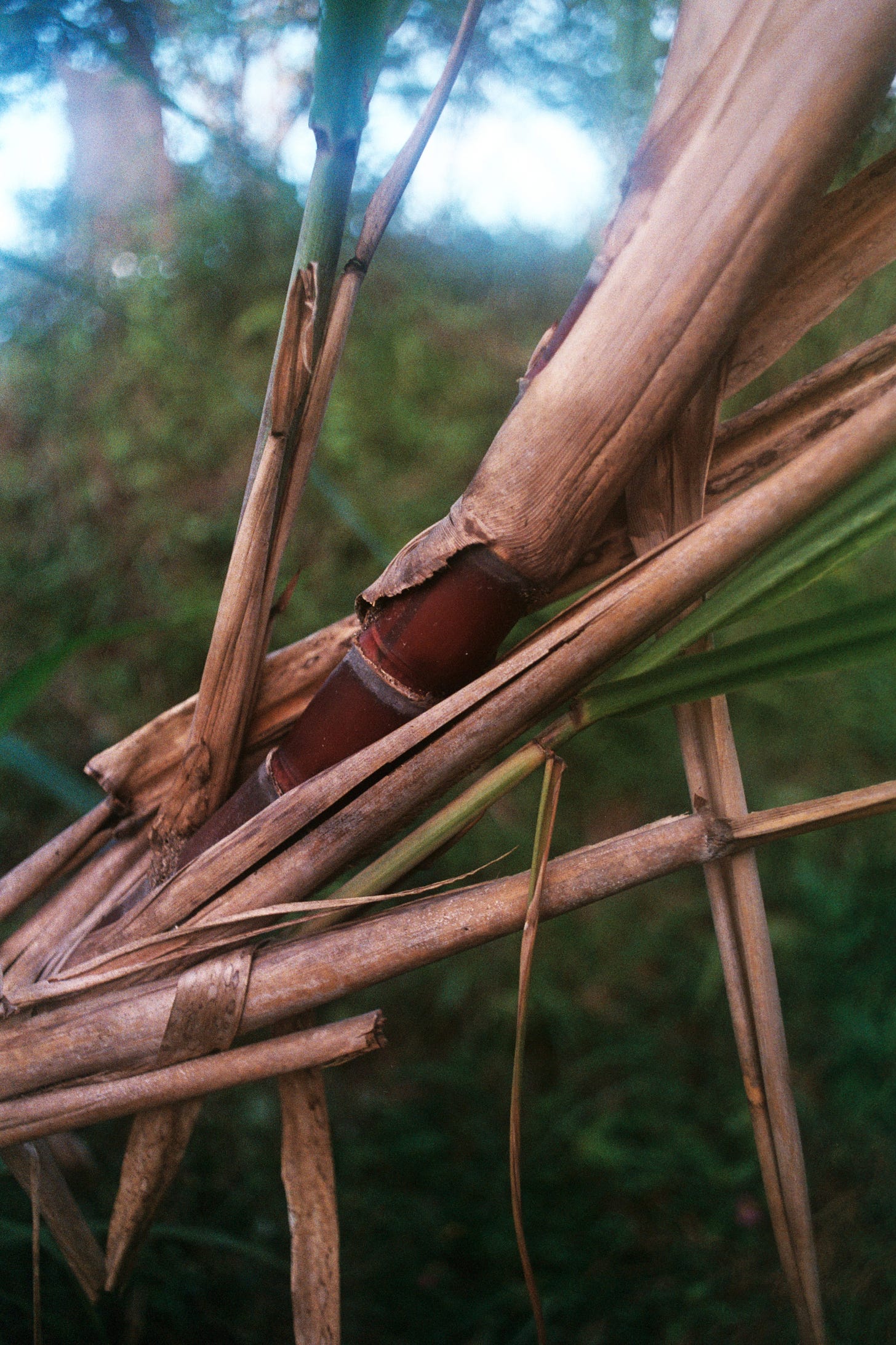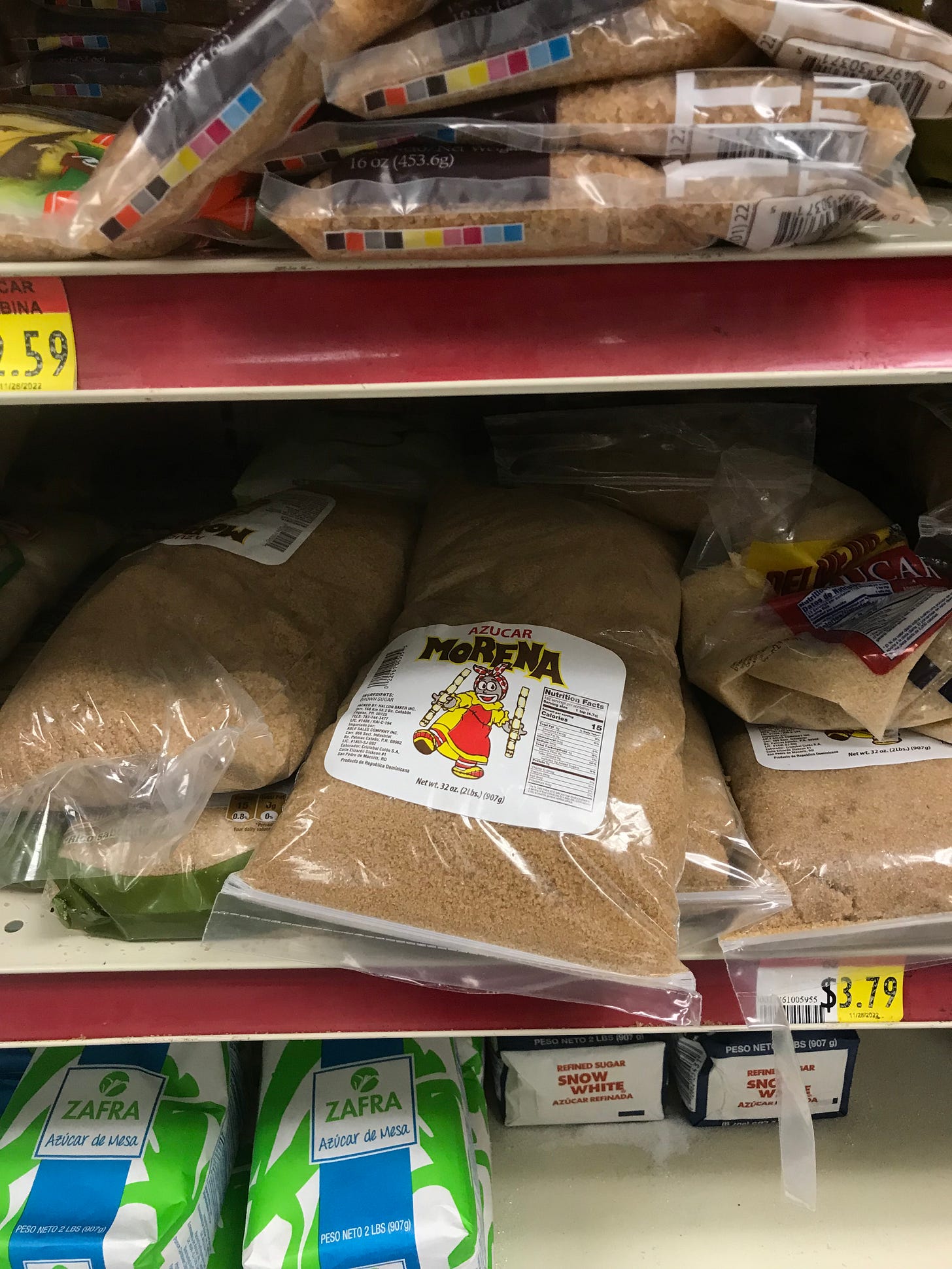Azúcar Morena, anti-Blackness in non English
How colonialism perpetuates racism in the sugar islands.
“Thank God racism doesn’t exist in Puerto Rico”, my teenage cousin told Alex and I around my abuela’s kitchen table.
Red sugar cane from the farm. Photo by Alex Matzke. For farm centric news, go to BuenoCompartir.substack.com
Seated around the square table with a plastic cover printed with banana trees, coco palms, and sugarcane stalks, having just finished arroz con habichuelas made in only the way that abuelas can make it, we’d been talking about summer 2020, the deep-rooted racism that built America, and the response that flowed through streets across the nation. My cousin understood the outrage, as he’d seen a million Puerto Ricans, one third of the entire population, pour into the streets the year prior, part of the global wave of protests that helped spark summer 2020 in the states, but the people’s fury about racism felt blissfully foreign to him.
His comment was a sincere comparison between life back in Puerto Rico and his younger years in New Jersey. In the states melanin affects everything. Growing up in Virginia, as one of few Puerto Ricans, I was always either too dark or too light, and so I changed my behavior accordingly, expanding or contracting certain parts of me depending on the room. At least three times in my life, code switching allowed me to diffuse threatening situations that involved guns. I’ve also been privileged to learn young that race doesn’t cross borders. I mean white supremacy has been propagated worldwide but it manifests in many more ways than I learned possible in Virginia. In Puerto Rico, my cousin is privileged to not see racism because he is not Black. In New Jersey, he had no choice because he is not white.
During childhood summers my abuela’s house, in the countryside of Guaynabo, I could blend in without having to speak - really the less I spoke the better. Under the unifying nationalist pride of Puerto Ricanness, where the Caribbean sun givens everyone a little melanin, as long as one speaks Spanish we can all fit under the ideological shade of a shared race umbrella. We all know that Spanish plus Taino plus African equals Puerto Rican and so we need not be divided by foreign ideas of racial difference. Racism doesn’t exist here. At least this is what we are told.
As I write this, social media has become ablaze with a TikTok video1 published last week. In it, three kids about my cousin’s age in a Comerio school do a little skit in their classroom during which one asks how to end racism. Another responds by saying the solutions is to kill all the Blacks. The third shouts ‘let’s go do it.’ They all cheer.
In reality, what my cousin was referring to was not the absence of race/ism in Puerto Rico, but the absence of discussion around it. In recent years, especially as Puerto Ricans continue to bounce back and forth between the states and the archipelago, there has been more open discussion about race. Still, most people Alex and I know will fall all over themselves to avoid the topic, and many scholars have written about the silencing that happens to anyone talking about race.2 In bringing up racism with our friends, college graduates no less, they struggle to even find the word racismo in their lexicon. Negro, moreno, mulatto, gringo, etc roll off the tongue much easier. This friction keeps white supremacy burning.
Halcón Bakery’s Azúcar Morena at Econo supermarket.
This bag of brown sugar is available at supermarkets across the island. The cheap plastic bag dawns a single sticker, Azúcar Morena, with a smiling, dancing, Black femme-presenting cartoon holding canes of sugar. She appears to represent both what sugar producers want consumers to believe ideologically and also what they want us to know: this ain’t white sugar. While 2020 promised to lay to rest the undead racisms of Aunt Jemima and Uncle Ben, such insulting caricatures not only continue to be marketed here, the images have yet to progress beyond Jim Crow era ‘mammy’ representations. I need not labor over the fact that this is an insulting misrepresentation of Black people, that should be painfully obvious, but it is worth pointing out that this is an insulting misrepresentation of the labor of sugar. The harvest of the dense, hard, towering cane is done by machete, the plants are covered in razor sharp leaves, and workers are expected to clear acres upon acres every day. The labor leaves sugar cutters, macheteros, bloodied and physically destroyed, loss of limb common in sugar’s legacy. This danger and destruction so inherent on sugar plantations made it slaves’ work.
Sugar cutting doesn’t exist in the U.S. psyche the way that cotton picking does; the American-centric view of the world makes one believe that the U.S. was the hub of slavery, therefore cotton the most important crop of the European Slave Trade. Really most of the enslavement of Africans had nothing to do with cotton or Confederates.





